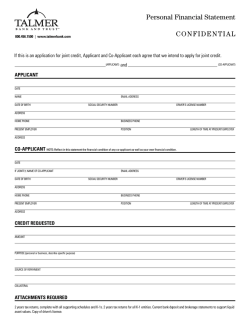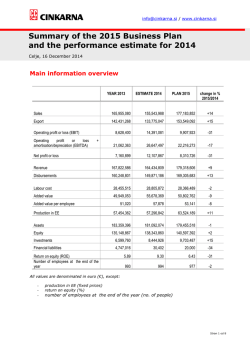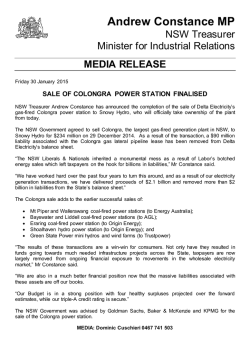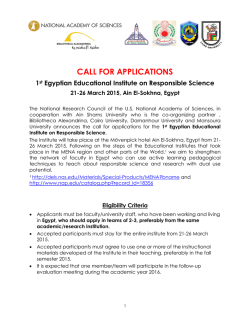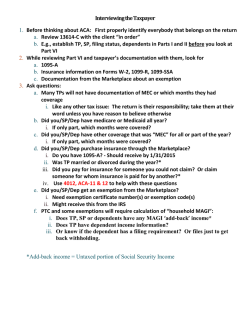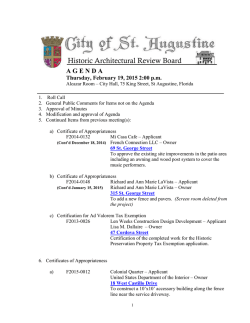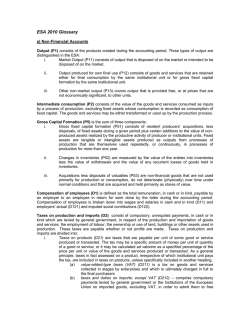
Tax Alert - 30 January 2015
ALERT l 30 JANUARY 2015 IN THIS ISSUE TAX ASSET-FOR-SHARE TRANSACTIONS AND THE ASSUMPTION OF (CONTINGENT) LIABILITIES CHANGES TO CRITERIA CONSIDERED BY SARS WHEN SUSPENDING PAYMENT OF TAX ASSET-FOR-SHARE TRANSACTIONS AND THE ASSUMPTION OF (CONTINGENT) LIABILITIES The South African Revenue Service (SARS) released Binding Private Ruling 185 (Ruling) on 11 December 2014, which deals with the disposal of assets and the assumption of (contingent) liabilities in terms of s42 of the Income Tax Act, No 58 of 1962 (Act). The applicant was a locally listed resident company having various resident wholly-owned subsidiaries. As part of a group restructuring, it was proposed that the applicant dispose of certain assets, including the shares in its subsidiaries, to a new company to be wholly owned by the applicant. The assets were used in the applicant’s incomeproducing business. As consideration for the transfer of the assets, the new company would issue shares in itself to the applicant, as well as assume certain liabilities and contingent liabilities. The liabilities would include debt attached to certain assets, and the contingent liabilities would include provisions for leave pay, incentives, environmental rehabilitation, share incentive scheme benefits, and post-retirement medical aid benefits. Equity shares would thus be issued to the applicant to the value of the net asset value of the assets, taking into account the liabilities and contingent liabilities being assumed. The Ruling assumes that: ■ the applicant will dispose of the assets at book value, and that there would be no consideration other than the issue of shares and the assumption of the liabilities and contingent liabilities; ■ the applicant will transfer “all the assets and liabilities (including contingent liabilities) that are attributable to and arose in the normal course of the business undertaking that is being disposed of…, as a going concern”; and ■ section 197(2)(a) to (d) of the Labour Relations Act, No 66 of 1995 will apply with reference to liabilities towards employees, and that the new company would not have recourse to the applicant in respect of the contingent liabilities. 1 | Tax Alert 30 January 2015 SARS ruled that the disposal of the assets “at net book value will constitute an ‘asset-for-share’ transaction under s42”. It appears from this Ruling that s42(4) of the Act, which provides that the roll-over relief provided for in s42 would only apply to the extent that the consideration constitutes equity shares, would not be applicable in these circumstances. This is presumably so because that part of the consideration constituting the assumption of the liabilities and contingent liabilities constitutes 'debt' as contemplated in s42(8) of the Act, which is saved from the application of s42(4). Section 42(8) of the Act refers to the disposal of “any business undertaking as a going concern to a company in terms of an asset-for-share transaction and that disposal includes any amount of debt that is attributable to, and arose in the normal course of that business undertaking”. The entire transaction would thus constitute an asset-forshare transaction as defined in s41(1) of the Act, and not only to the extent that the consideration constitutes equity shares. It is interesting to note that the Ruling suggests that contingent liabilities constitute an 'amount of debt' as contemplated in s42(8)(b) of the Act. SARS further ruled that the new company would only be allowed to claim a deduction in respect of the contingent liabilities to the extent that the requirements of s11(a), read with s7B and 23(g), are complied with at the time that the contingent liabilities are realised. Regard must be had to the context of the business existing prior to the transfer of the business when determining whether the requirements for deduction are met. The fact that the contingent liabilities were assumed as part of the consideration for the assets must be ignored. continue ALERT l 30 JANUARY 2015 With reference to the provisions for environmental rehabilitation, SARS ruled that future payments may be deductible under s37A of the Act, provided that those requirements are met at the time. Again, no regard must be had to the fact that the contingent liabilities were assumed as part of the consideration for the assets. Tax The treatment of contingent liabilities in this Ruling appears to be consistent with the treatment of what SARS has referred to as ‘free-standing contingent liabilities’ in its previous discussion paper on contingent liabilities. Heinrich Louw CHANGES TO CRITERIA CONSIDERED BY SARS WHEN SUSPENDING PAYMENT OF TAX When the Tax Administration Act, No 28 of 2011 (TAA) was promulgated on 1 October 2012 it introduced rather aggressive provisions empowering the South African Revenue Service (SARS) to collect tax more effectively, including the retention of the pay-now-argue-later principle. However, s164 of the TAA allows a taxpayer to request a suspension of the obligation to pay an amount of tax or a portion thereof under an assessment where the taxpayer disputes or intends to dispute the liability to pay that tax under the dispute resolution provisions contained in Chapter 9 of the TAA. Previously, s164(3) of the TAA provided that a senior SARS official may suspend payment of the disputed tax or a portion thereof having regard to: ■ the compliance history of the taxpayer; ■ the amount of tax involved; ■ the risk of dissipation of assets by the taxpayer concerned during the period of suspension; ■ whether the taxpayer is able to provide adequate security for the payment of the amount involved; ■ whether payment of the amount involved would result in irreparable financial hardship to the taxpayer; ■ whether sequestration or liquidation proceedings are imminent; ■ whether fraud is involved in the origin of the dispute; or ■ whether the taxpayer has failed to furnish information requested under the TAA for purposes of a decision under s164. Generally, SARS would not consider a request under s164 without the taxpayer dealing with and providing adequate motivation in respect of all the said criteria. The Tax Administration Laws Amendment Act, No 44 of 2014 (TALA) has now introduced amendments to the factors listed in s164(3), with effect from 20 January 2015. The amended s164(3) states that a senior SARS official may suspend payment of the disputed tax or a portion thereof having regard to relevant factors, including: ■ whether the recovery of the disputed tax will be in jeopardy or there will be a risk of dissipation of assets; ■ the compliance history of the taxpayer with SARS; 2 | Tax Alert 30 January 2015 ■ whether fraud is prima facie involved in the origin of the dispute; ■ whether payment will result in irreparable hardship to the taxpayer not justified by the prejudice to SARS or the fiscus if the disputed tax is not paid or recovered; or ■ whether the taxpayer has tendered adequate security for the payment of the disputed tax and accepting it is in the interest of SARS or the fiscus. It is clear from the changes introduced by the TALA that some of the criteria previously contained in s164(3) have now been removed, and it appears that it would now be more difficult to obtain a suspension of payment of tax. Previously, a taxpayer was required to state whether fraud was involved in the origin of the dispute. This criterion has now been amended to afford SARS an opportunity to exercise its discretion to decline a request if, at first sight, it considers fraud to have been involved in the origin of the dispute. Taxpayers could previously aver that the payment of the tax, or portion thereof, would result in irreparable hardship to the taxpayer. This criterion has now been amended to allow for the prejudice to SARS or the fiscus if the tax is not paid or recovered to be weighed up against the hardship which the taxpayer will suffer if the tax were to be paid. It is also no longer sufficient for the taxpayer to tender adequate security for the payment of the tax, as SARS will now also be required to consider whether accepting this security is in the interest of SARS or the fiscus. An interesting amendment to s164(3) is that the list of criteria is no longer an exhaustive list. Section 164(3) now provides that the new criteria are only relevant factors to continue ALERT l 30 JANUARY 2015 be considered, and the word 'including' opens the door for further relevant factors to be considered when exercising SARS’ discretion, which means that both the taxpayer and SARS will be able to consider additional relevant factors not listed in this subsection. What further factors SARS will consider relevant remains to be seen and will most likely depend on the specific circumstances and facts of each matter. It should be noted that it was previously proposed to amend the criteria to specifically allow SARS an opportunity to also consider the merits of the matter when exercising its 1st in M&A Deal Flow, 1st in M&A Deal Value, 1st in Unlisted Deals - Deal Flow. 1st in M&A Deal Flow, 1st in General Corporate Finance Deal Flow, 1st in General Corporate Finance Deal Value, 1st in Unlisted Deals - Deal Flow. 1st in M&A Deal Flow, 1st in M&A Deal Value, 1st in General Corporate Finance Deal Flow, Legal Advisor - Deal of the Year. 3 | Tax Alert 30 January 2015 Tax discretion in s164 of the TAA, however, this amendment did not find its way into the final TALA. It is clear from these amendments that, going forward, it will be harder for a taxpayer to persuade SARS to suspend the obligation to pay a disputed amount of tax. Mareli Treurnicht WE SECURED THE REALLY BIG 5 WE ARE THE NO.1 LAW FIRM FOR CLIENT SERVICE EXCELLENCE FIVE YEARS IN A ROW. ALERT l 30 JANUARY 2015 Tax CONTACT US For more information about our Tax practice and services, please contact: Emil Brincker National Practice Head Director T +27 (0)11 562 1063 E [email protected] Andrew Lewis Director T + 27 (0)11 562 1500 E [email protected] Tessmerica Moodley Senior Associate T +27 (0)21 481 6397 E [email protected] Ben Strauss Director T +27 (0)21 405 6063 E [email protected] Mareli Treurnicht Senior Associate T + 27 (0)11 562 1103 E [email protected] Ruaan van Eeden Director T +27 (0)11 562 1086 E [email protected] Gigi Nyanin Associate T + 27 (0)11 562 1120 E [email protected] Lisa Brunton Senior Associate T + 27 (0)21 481 6390 E [email protected] Nicole Paulsen Associate T + 27 (0)11 562 1386 E [email protected] Heinrich Louw Senior Associate T +27 (0)11 562 1187 E [email protected] This information is published for general information purposes and is not intended to constitute legal advice. Specialist legal advice should always be sought in relation to any particular situation. Cliffe Dekker Hofmeyr will accept no responsibility for any actions taken or not taken on the basis of this publication. BBBEE STATUS:LEVEL LEVELTHREE THREECONTRIBUTOR CONTRIBUTOR BBBEE STATUS: JOHANNESBURG 1 Protea Place Sandton Johannesburg 2196, Private Bag X40 Benmore 2010 South Africa Dx 154 Randburg and Dx 42 Johannesburg T +27 (0)11 562 1000 F +27 (0)11 562 1111 E [email protected] CAPE TOWN 11 Buitengracht Street Cape Town 8001, PO Box 695 Cape Town 8000 South Africa Dx 5 Cape Town T +27 (0)21 481 6300 F +27 (0)21 481 6388 E [email protected] cliffedekkerhofmeyr.com Cliffe Dekker Hofmeyr is a member of DLA Piper Group, an alliance of legal practices. ©2015 0294/JAN
© Copyright 2026
